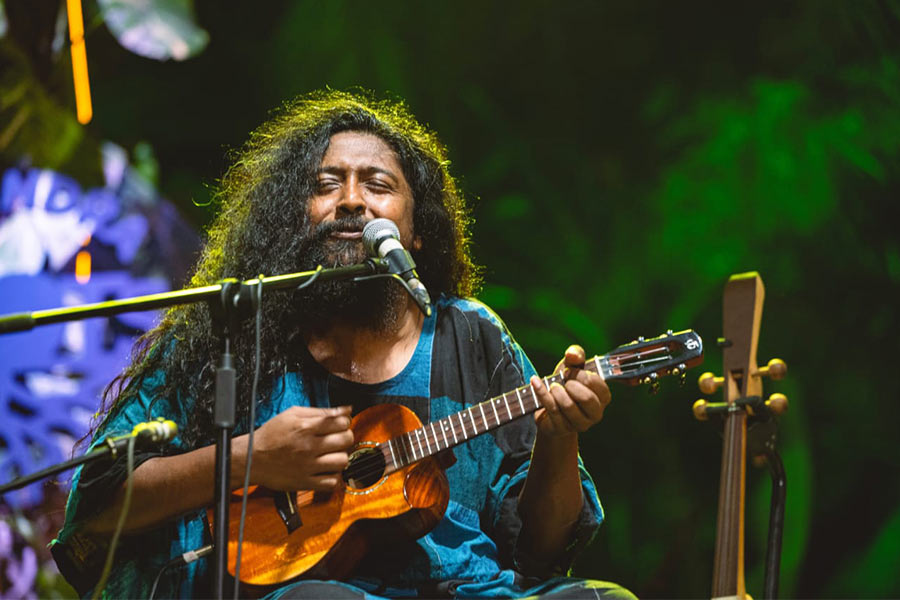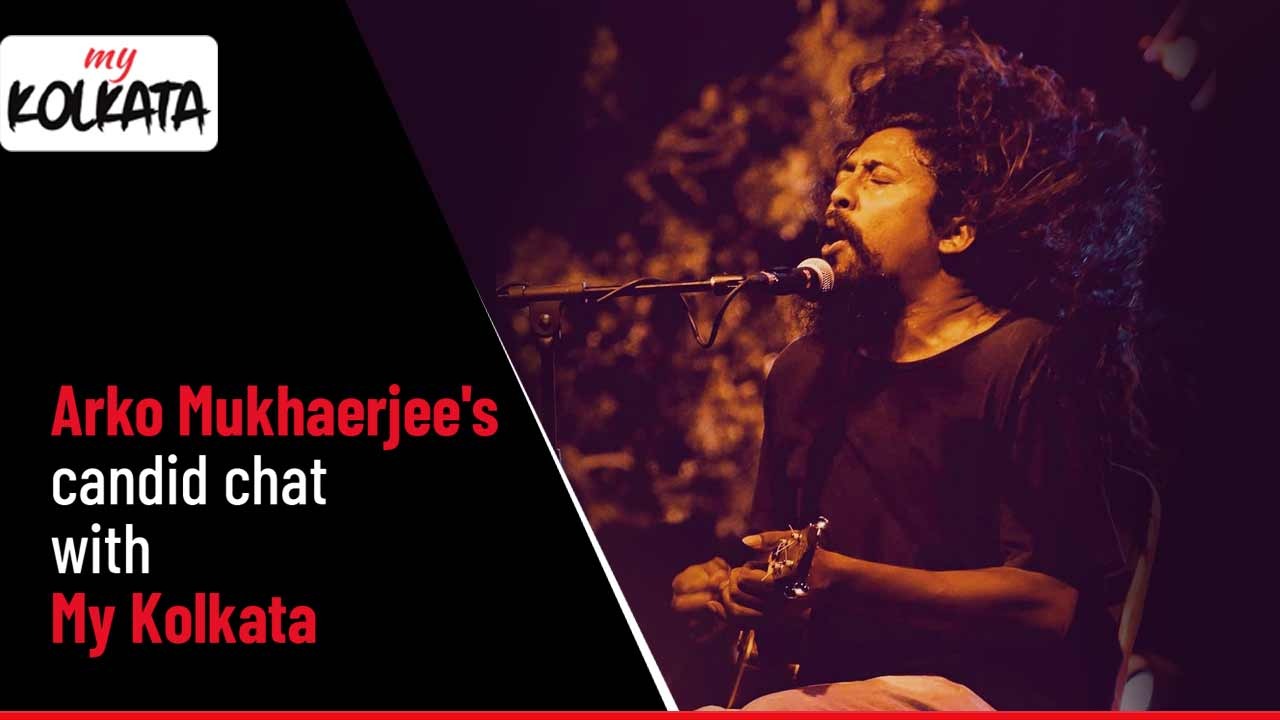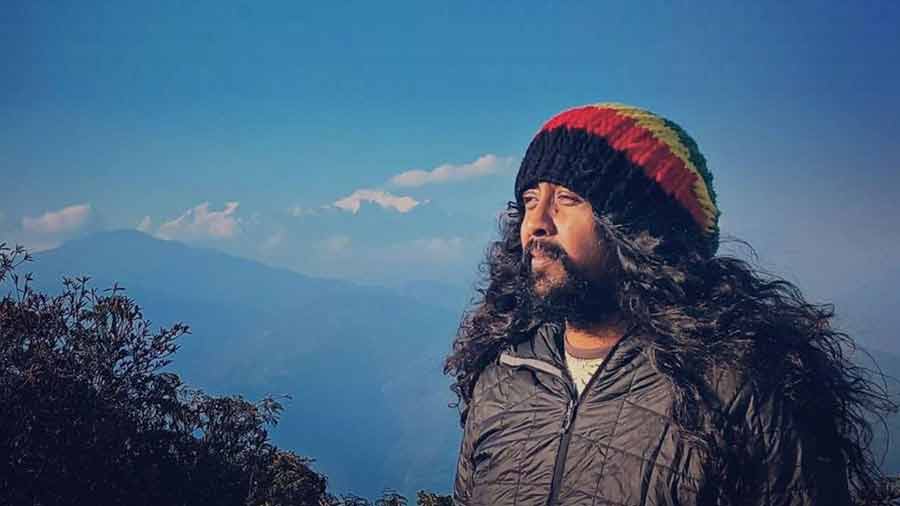At the end of SWEAT - Smells of Labour, the dance theatre production conceptualised by Arko Mukhaerjee and his wife, choreographer Sandra ‘Babli’ Chatterjee, with thespian Joyraj Bhattacharjee and danseuse Srabanti Bhattacharya, a package, almost like a prize packet, is dropped over a Munich audience at Einstein Kultur, one of the largest art spaces in the German city. It contains the clothes of a migrant labourer from the Priyonath Manna Bustee in Baje Shibpur, Howrah. Taken out of its vacuum-sealed enclosure, the sweat-laden clothes immediately fill up the room — “an European room” — with an unfamiliar smell. It’s a direct, sensory representation of what unfolded in that performance space over the past hour and so, through movement choreographed by Sandra, through music played and sung by Arko.
As Arko and his comrades sing Which Side Are You On?, the mine-workers’ ditty penned by Florence Reece in 1931 and later made famous by Pete Seeger, to that stunned Munich audience, there is an “immediate shift, with some in the crowd moving to the stage to sing with us, while the others watch”. It bridges the divide between audience and performer, messenger and receiver.
It is this process of reaching out that has underlined Arko’s journey since 2016. Yes, he sings because it gives him pure joy, says the Munich-based, Kolkata-bred singer. However, it is more and more apparent that singing, alone, as a form of expression, isn’t enough, and has not been enough for a while for the Thakurpukur boy.
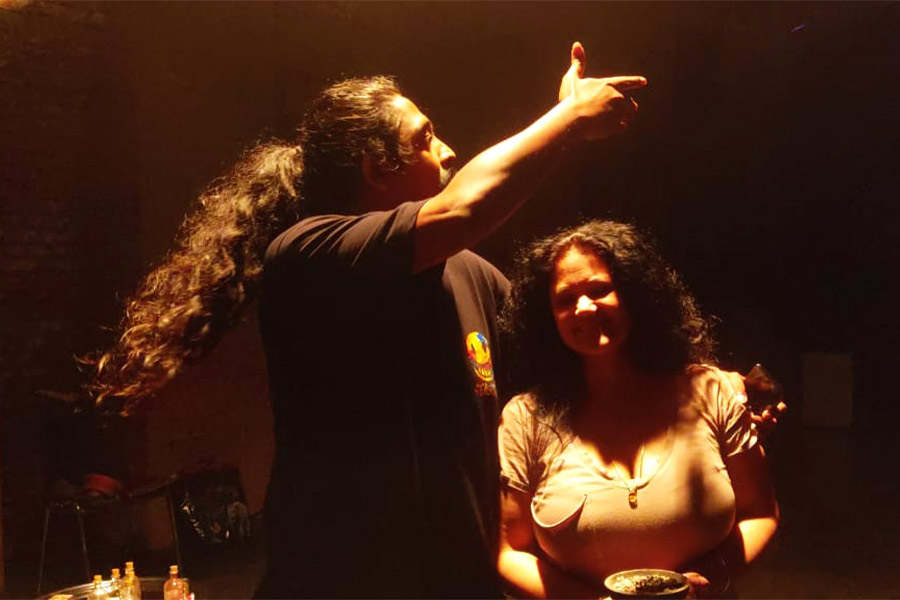
Setting up lights for ‘Smells of Co-existence’ with Sandra Chatterjee at Einstein Kultur, in Munich, 2022 Courtesy: Arko Mukhaerjee
The pandemic and beyond
The COVID-19 pandemic brought on tectonic shifts upon lives, personal ones included. During the first wave of the pandemic, Arko’s association with Joyraj and Srabanti deepened as they opened up a langar at the Priyonath Manna Bustee.
Then, Cyclone Amphan hit coastal Bengal, destroying an already-ravaged state and its people and their livelihoods almost overnight. The PM Bustee canteen needed funds; the Amphan-affected areas needed food and medicines. Immediately.
Desperate to raise money, Arko picked up his ukulele and sang for an online audience to help those affected by the devastating cyclone — an experience that shattered him emotionally — but signalled the start of a new direction in his artistic journey. As life would have it, Arko met Sandra, his future wife, through such fund-raising endeavours.
“Sandra is a trained dancer, and as a scholar of the forms (Kuchipudi and Bharatnatyam) her research has moved beyond the art to encompass ethnic identities, sexual politics and class divide,” says Arko. Through working together, Arko came to know about one of her research projects on smell — especially the politics of smell, the ‘everyday prejudices against different body odours or different fragrance traditions’. By tracing the ethnography of racism and classism divides through an anthropology of smell and translating that into movement, Sandra has been working in an area that has hardly found mention in mainstream classical Indian dance.
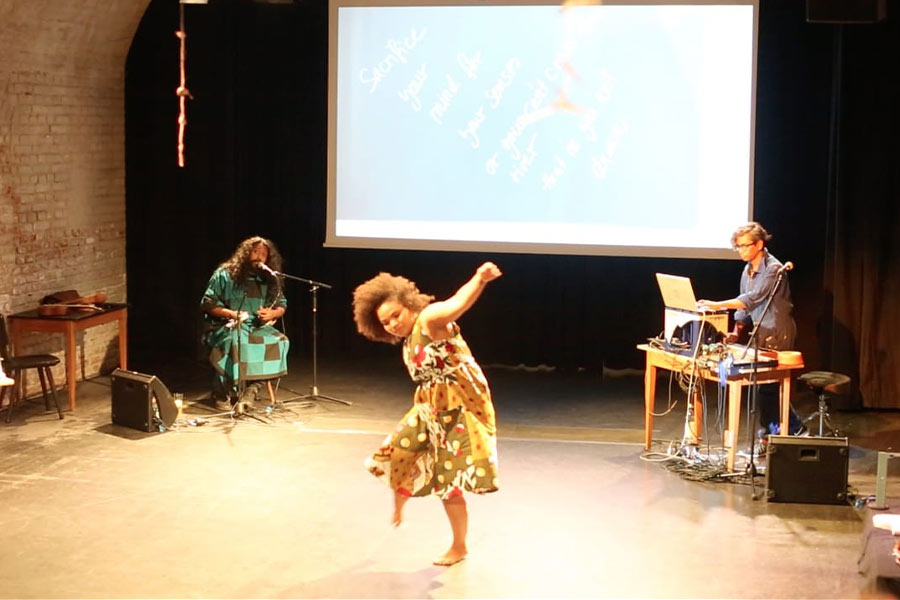
A segment from ‘Smells of Co-Existence’, with African contemporary dance practitioner Dudu Zila, and Kanishka Sarkar handling live electronica, at Einstein Kultur, Munich Courtesy: Arko Mukhaerjee
“In my childhood, my mother would say, ‘Paa ta dhuye aye, chaashar moton gondho berocchey’ (‘Go wash your feet, you smell like a farmer’) – a blatantly politically incorrect statement. What does a farmer smell like, and is that necessarily an unpleasant odour? The statement marks a class divide, and it is immediately brought on through the senses,” Arko explains, “I became curious about Sandra’s research, given where I lived — in Thakurpukur. I was definitely interested in learning about the politics of smell, here and in Western society.”
As the couple met, travelled across continents and tied the knot, over the past three years, Sandra’s research on these ideas has given rise to three different projects in an amalgamation of music, dance and theatre: ‘Smells of Racism’, ‘Smells of Co-Existence’, and ‘SWEAT - Smells of Labour’. Essentially choreographed dance-theatre, these productions feature Arko along with a wide range of collaborators, including Joyraj and Srabanti (for ‘SWEAT’), Berlin-based electronica producer (and former member of the Bangla band Cactus) Kanishka ‘Pinky’ Sarkar, and guitarist Koustav De and percussionist Sajib Sarkar. All of these focus on stories of the marginalised, and the process of marginalisation.
Changed perspectives
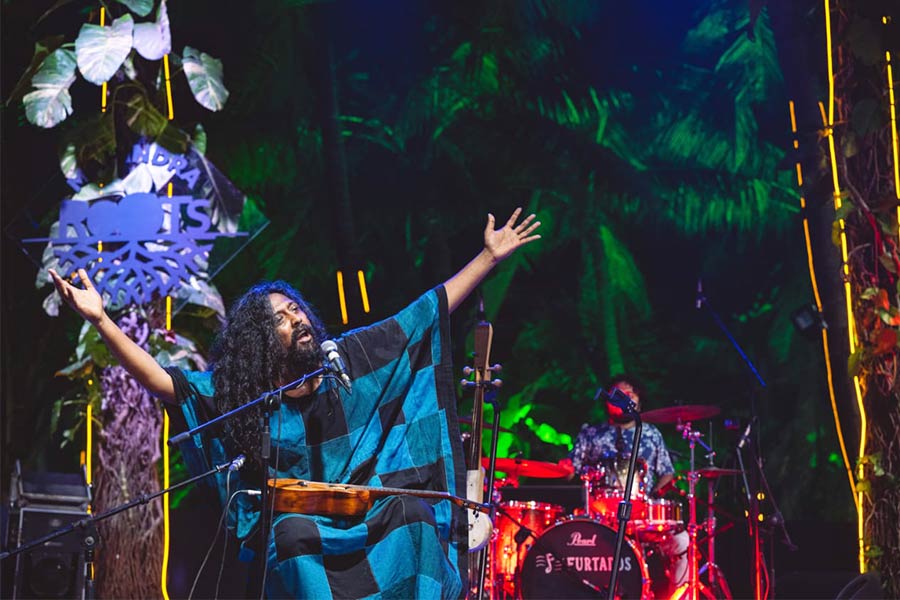
Performance with the Arko Mukhaerjee Collective at Soul Local, Kolkata Courtesy: Arko Mukhaerjee
The langar at Priyonath Manna Bustee saw 700 people on the first day, 950 on the second day; 1,300 on the third. “Following Amphan, residents of the bustee came to tell us that we should just give them bhindi, or just rice, for the next two weeks — and direct the money and resources to those that have been affected by the terrifying cyclone,” recalls Arko, “I met so many kinds of people, working through that entire experience; including those ready to snatch away the sacks of rice being prepped to send to the Sunderbans. I saw the same people turn up at my show the next day! Maybe the purpose of it all got to them somehow. If the other person is trying hard to arrive at my language for assimilation, who am I to deny it?”
In this, Arko says, language, as much as he loves it, can be a barrier. “At this point, I want to communicate, and if 10 people are willing to listen, that is fine by me. I have stopped looking at myself only as a musician,” he explains.
Instead, Arko finds himself drawn more towards theatre practices, where dance, music and drama are intertwined and where the politics of identity is emphasised. Dance, specifically, as the expression of identity, and the political statement it can carry, has left a deep impact on him.
Griot and Gandharva
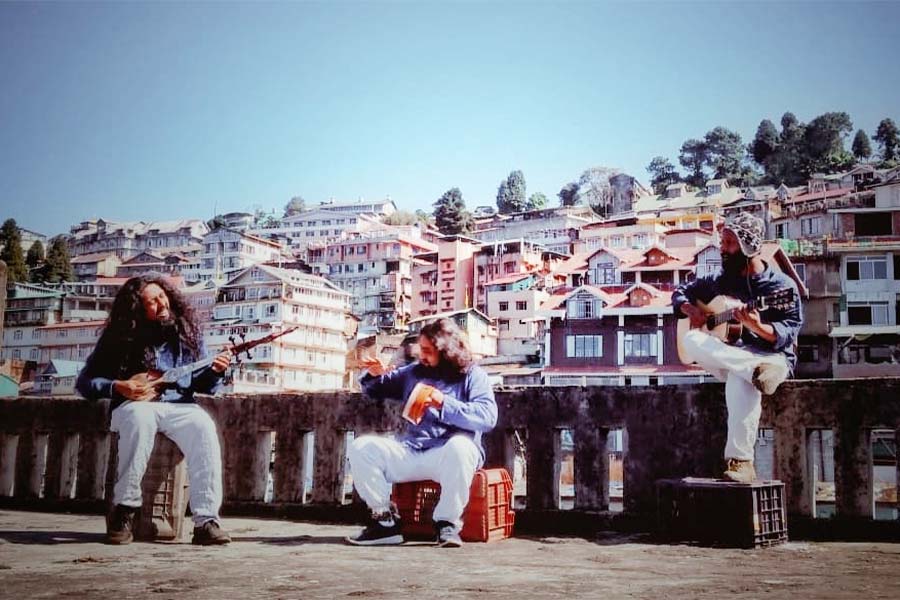
Singing in Tamang Bustee, above the main market in Darjeeling, with Koustav De on guitar and Sajib Sarkar on percussions Courtesy: Arko Mukhaerjee
As a boy travelling with his father to the upper reaches of north Bengal from a young age, Arko calls the Sandakphu zone his ‘second home’. Over the past six years, he has travelled through the terrain to collect and curate many unknown Nepali songs. “I find the people of the Bengal hills refugees in their own land, trapped in a situation where they did not immigrate, but where the borders crossed over in British India to make them a part of this state, with a very different culture at its core. We need to sing the songs of these people,” he emphasises.
The other form of music that Arko has been immersed in comes from West Africa — the ritual griot that is intrinsically linked to the tradition of storytelling, a troubadour form similar to Baul and Fakiri music from Bengal.
While Sandra and Pinky are his ‘primary’ collaborators in Germany, experimental projects are what keeps Arko excited, like his duo with Berlin-based jazz guitarist Nishad Pandey. The two just recorded four songs in end-2023, to be released as an EP soon.
With Pinky, Arko performs as a duo named Ashram, a folk-meets-live electronica project that has been steadily releasing singles, mainly Bengali songs in the Sufi lineage from east Bengal, and Nepali songs in the Sahajiya Buddhist tradition. “We keep sampling folk instruments wherever we go,” smiles Arko.
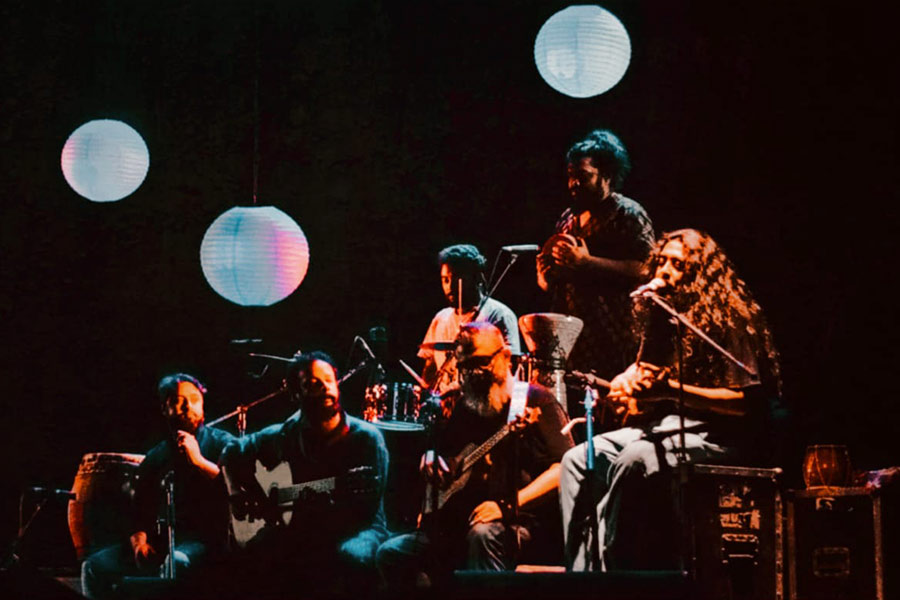
In performance with Gaurab Chatterjee on percussions, at Buland Iraadein, a fundraiser for the PM Bustee Committee, at the Academy of Fine Arts, in 2021 Courtesy: Arko Mukhaerjee
What about a full-length Bangla album of his own music? Not immediately, he says: “For me, publishing music is more about being reactive to times. I tend to record singles, like the one I did with (Grammy-nominated bluegrass fiddler) Casey Driessen as a statement of solidarity during the 2019 CAA protests.”
“A song carries a truth, and I want to carry that truth to more people, in my own way. If I want to be anything at all, it is to be a people’s musician,” says Arko.
Like Pete Seeger?
Arko can’t help smiling: “He sang other people’s songs throughout his life — one of his last recorded songs was (Bob Dylan’s) Forever Young.”
No simple highway
Big-ticket festival appearances, collaborations and recording dates with friends in the Kolkata rock’n’roll fraternity aside, Arko says he is really looking forward to the first Canteen Art Festival at the PM Bustee Community Kitchen from January 26-28 — a gathering that will bring artistes from the world of dance, theatre, cinema and music for a three-day celebration of the spirit of the locality, over performances, adda and cha-biskut. This, in Howrah. In 2024, in Munich, the follow-ups to ‘Smells of Racism’ and ‘SWEAT’ are already works in progress.
The focus, now, Arko says, is on building a cultural centre at PM Bustee — a 600-700 square feet space of two or three stories, where the ground floor would be the canteen, and the running costs of the canteen will be borne by cultural activities to be staged on the two floors above.
“For resistance to be ongoing, support cannot remain permanent. Yes, I have seen support, and I have seen support fall away, as well. At the end of it all, the path to the vision is what matters; once achieved, we simply have to move on,” Arko says.
As life does.
